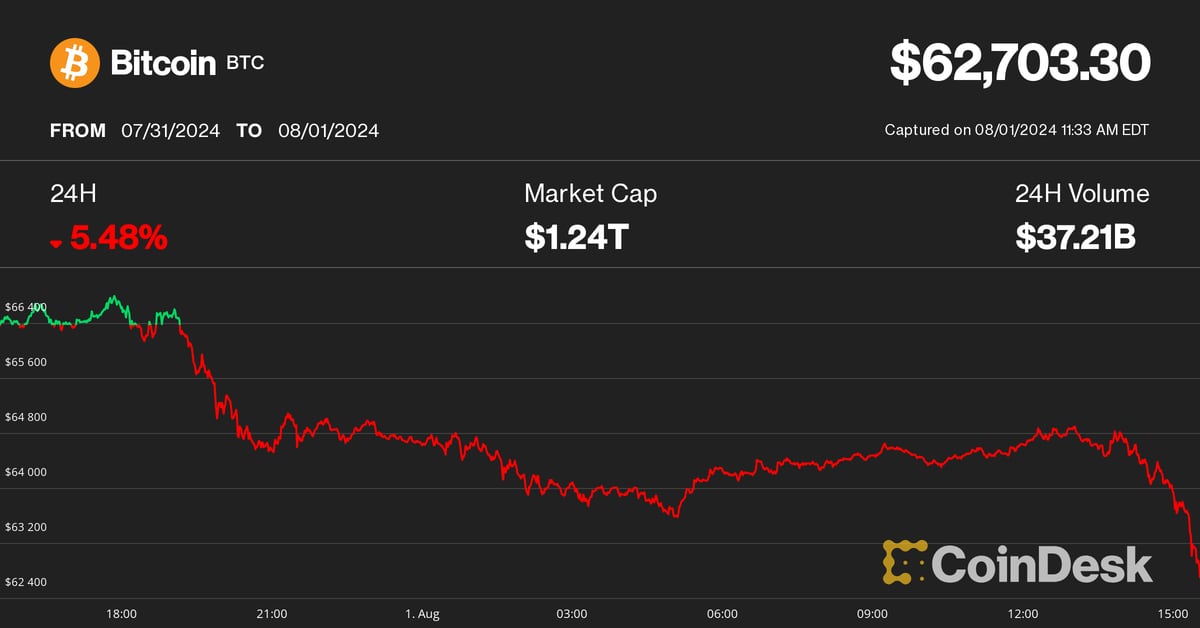Blockchain
In the most important election year in history, cryptocurrencies take center stage

Voters queue to cast their votes outside a polling station during the first phase of voting in… [+] India’s general elections, in Dugeli village about 33 km (21 miles) from Dantewada town in Chhattisgarh state on April 19, 2024. As the world’s largest democracy began its six-week elections on April 19, thousands of people in the villages of Bastar district, one of the last strongholds of the Naxal rebels, voted. (Photo by Idrees MOHAMMED/AFP) / TO GO WITH ‘India-vote-conflict-maoist’, FOCUS by Bhuvan Bagga (Photo by IDREES MOHAMMED/AFP via Getty Images)
AFP via Getty Images
This year, more than two billion people are eligible to vote in more than 60 general elections in the European Union, the United Kingdom, India and, of course, the United States. According to Time, it’s almost half of the world’s population (49%) heading to the polls in 2024. But while voters traditionally focus on domestic issues before casting their ballots, one issue that unites people from Utah to Uttar Pradesh is cryptocurrencies.
You may have heard of it Khaki elections, where millions of soldiers, many of them still in uniform, return home from wars and disrupt the established political order. Well, history may record 2024 as the year of the crypto-election, marking the emergence of a voting bloc that spans countries (and even continents) on an issue that affects us all.
2024: the year of super elections
Statesman
Compared to all the other factors at play – an uncertain economy, rising unemployment, war in Europe, Biden versus Trump – cryptocurrencies might seem like a niche issue. But that would be to underestimate the millions of people for whom the cryptocurrency and decentralization revolutions have become a way of life. Just as khaki-clad voters proved pollsters wrong in the past, in 2024 it is cryptocurrency enthusiasts who could change the results in democracy’s biggest year yet.
Rise of the crypto faction
If you’re reading this in a country that’s going to the polls this year, you probably haven’t heard the media mention cryptocurrencies as a major election issue. However, there is clear evidence to show that this is an increasingly important factor for a large percentage of voters.
Earlier this month, a survey by the National Crypto Council in the United States have indicated that the cryptocurrency vote could be a key issue in deciding the next election. About eight in ten respondents believe a candidate’s stance on cryptocurrency issues is at least “somewhat important” to their vote, while an overwhelming majority of 83% of crypto voters say they would prefer a candidate who “wants to write clear rules for cryptocurrencies so that investors can continue to have choices and the industry can continue to grow and create jobs.”
Bangkok, Thailand – July 1, 2021: Cryptocurrency on Binance trading app, Bitcoin BTC with altcoin… [+] cryptocurrency digital currency, BNB, Ethereum, Dogecoin, Cardano, defi p2p decentralized fintech market
getty
This survey suggests that cryptocurrencies will continue to be a major political issue in the United States and will only grow as adoption continues to increase. And the key thing here is that the problem is not just the regulation of cryptocurrencies. Another significant finding from the survey is the broader current of dissatisfaction with a financial system perceived by many as unfair to ordinary people, with 50% of respondents agreeing that access to financial products and services is only “fair” or “poor”.
It is worth mentioning the 2000 American presidential elections, when a few hundred votes in Florida changed the course of history. Considering the extremely different attitudes of Trump and Biden towards cryptocurrencies, this block could have an equally important impact in 2024.
Kristin Smith, CEO of the Blockchain Association, highlighted the growing importance of cryptocurrency in the upcoming elections. She noted that digital assets are becoming a crucial issue for voters, especially in swing states. Smith said that “digital assets have emerged as a significant issue in the upcoming election,” noting that a substantial portion of voters are actively considering candidates’ positions on cryptocurrencies when making their decisions (Cointelegraph). This highlights the growing importance of crypto politics in shaping the political landscape as we approach the 2024 elections.
Courting the industry
Individual cryptocurrency users aren’t the only people political parties need to win over: the industry has also become a key component. This is especially evident in the European Union, where we are seeing the emergence of a unified voice for the cryptocurrency industry.
Ahead of the European Parliament elections, four cryptocurrency trader associations joined together to create a “manifesto for blockchain”, warning that the EU is losing ground to America and Asia in developing new digital economic models.
Three key pillars of the Blockchain Manifesto for Europe
Blockchain Manifesto for Europe
Seemingly in every election, candidates want to appear pro-business and embrace industry concerns. Now the cryptocurrency and blockchain sectors are emerging as a significant economic bloc. This includes the UK, where there are senior industry executives they seem to be swinging their support from the incumbent Conservative Party, traditionally seen as more pro-business, to the Labor Party which many expect to win a landslide victory when Britons go to the polls on July 4th.
Blockchain’s missed opportunity
In cryptocurrencies we talk about “TGE”: token generation events that generate a huge spike in interest and adoption for a new coin. We are still waiting for that one blockbuster event that puts blockchain on the map for the masses and demonstrates its incredible transformative utility.
The general election should be that event. After all, one of blockchain’s (many) superpowers is to create an unalterable and indisputable record of transactions and interactions. The implications for elections are obvious… but we are still waiting for the first “blockchain elections”. At one point, it looked like India might be first, given the huge interest in (and adoption of) cryptocurrencies in the world’s most populous democracy, both from individuals and industries. The Indian government also supports blockchain, naming it among the key technologies to achieve the goal of becoming a $5 trillion economy by 2028.
Close-up of human hand casting and placing a vote, choosing and making a decision about what it wants… [+] in the ballot box with the flag of India mixed in the background
getty
Unfortunately for cryptocurrency enthusiasts, this year’s Indian elections took place without blockchain playing a significant role. The wait for the world’s first Blockchain elections continues. With concerns about voter fraud, AI-driven misinformation, and fake news rising, however, it seems only a matter of time before blockchain plays a crucial role in the electoral process.
On the agenda and the vote
All of this marks an incredible turning point in the short but extraordinary history of cryptocurrencies. Four or five years ago, politicians were almost unanimous in their condemnation of Bitcoin and other digital currencies, and it was a truly courageous candidate to put his head over the parapet and express his support.
Cryptocurrencies as an election issue could represent a key opportunity for political candidates.
Blockchain Association
In this election cycle, cryptocurrencies are firmly on the agenda, and politicians can no longer plead ignorance or remain indecisive. This is demonstrated by a recent Harris poll in the United States, which found that one in three voters have considered a candidate’s position on cryptocurrencies, while over three-quarters say presidential candidates should have an “informed perspective” on the topic. Whether citizens have embraced cryptocurrencies or not, they know it’s important and want their representatives to be informed about the issue. Whatever the results around the world, one thing is certain: cryptocurrencies are firmly on the political agenda – and could hold big surprises later this year.
Blockchain
Bitcoin (BTC) Price Crashes as Donald Trump’s Win Odds Dip

Markets received nominally good news on Thursday morning, with the US ISM manufacturing PMI for July falling much more than economists expected, sending interest rates to multi-month lows across the board. Additionally, initial jobless claims in the US jumped to their highest level in about a year. Taken together, the data adds to the sentiment that the US is on the verge of a cycle of monetary easing by the Federal Reserve, which is typically seen as bullish for risk assets, including bitcoin.
Blockchain
Terra Blockchain Reboots After Reentry Attack Leads to $4M Exploit

Please note that our Privacy Policy, terms of use, cookiesAND do not sell my personal information has been updated.
CoinDesk is a awarded press agency that deals with the cryptocurrency sector. Its journalists respect a rigorous set of editorial policiesIn November 2023, CoinDesk has been acquired from the Bullish group, owner of Bullisha regulated digital asset exchange. Bullish Group is majority owned by Block.one; both companies have interests in a variety of blockchain and digital asset businesses and significant digital asset holdings, including bitcoin. CoinDesk operates as an independent subsidiary with an editorial board to protect journalistic independence. CoinDesk employees, including journalists, are eligible to receive options in the Bullish group as part of their compensation.
Blockchain
$6.8M Stolen, ASTRO Collapses 60%

In the latest news in the blockchain industry, there has been a turn of events that has severely affected Terra and its users and investors, with the company losing $6.8 million. The attack, which exploited a reentry vulnerability in the network’s IBC hooks, raises questions about the security measures of the once celebrated blockchain protocol.
A web3 security company, Cyvers Alerts reported that the exploit occurred on July 31st and caused the company to lose 60 million ASTRO, 3.5 million USDC500,000 USDTand 2. 7 BitcoinThe flaw was discovered in April and allows cybercriminals to make payments non-stop by withdrawing money from the network.
Earth’s response
Subsequently, to the hack employed on the Terra blockchain, its official X platform declared the Suspension network operations for a few hours to apply the emergency measure. Finally in its sendTerra’s official account agreed, sharing that its operations are back online: the core transactions that make up the platform are now possible again.
However, the overall value of the various assets lost in the event was unclear.
Market Impact: ASTRO Crashes!
The hack had an immediate impact on the price of ASTRO, which dropped nearly 60% to $0.0206 following the network shutdown. This sharp decline highlights the vulnerability of token prices to security breaches and the resulting market volatility.
This incident is not the first time Terra has faced serious challenges. Earlier this year, the blockchain encountered significant problems that called into question its long-term viability. These repeated incidents underscore the need for stronger security measures to protect users’ assets and maintain trust in the network.
The recent Terra hack serves as a stark reminder of the ongoing security challenges in the blockchain space. As the platform works to regain stability, the broader crypto community will be watching closely.
Read also: Record Cryptocurrency Theft: Over $1 Billion Stolen in 2024
This is a major setback for Terra. How do you think this will impact the blockchain industry?
Blockchain
Luxembourg proposes updates to blockchain laws | Insights and resources

On July 24, 2024, the Ministry of Finance proposed Blockchain Bill IVwhich will provide greater flexibility and legal certainty for issuers using Distributed Ledger Technology (DLT). The bill will update three of Luxembourg’s financial laws, the Law of 6 April 2013 on dematerialised securitiesTHE Law of 5 April 1993 on the financial sector and the Law of 23 December 1998 establishing a financial sector supervisory commissionThis bill includes the additional option of a supervisory agent role and the inclusion of equity securities in dematerialized form.
DLT and Luxembourg
DLT is increasingly used in the financial and fund management sector in Luxembourg, offering numerous benefits and transforming various aspects of the industry.
Here are some examples:
- Digital Bonds: Luxembourg has seen multiple digital bond issuances via DLT. For example, the European Investment Bank has issued bonds that are registered, transferred and stored via DLT processes. These bonds are governed by Luxembourg law and registered on proprietary DLT platforms.
- Fund Administration: DLT can streamline fund administration processes, offering new opportunities and efficiencies for intermediaries, and can do the following:
- Automate capital calls and distributions using smart contracts,
- Simplify audits and ensure reporting accuracy through transparent and immutable transaction records.
- Warranty Management: Luxembourg-based DLT platforms allow clients to swap ownership of baskets of securities between different collateral pools at precise times.
- Tokenization: DLT is used to tokenize various assets, including real estate and luxury goods, by representing them in a tokenized and fractionalized format on the blockchain. This process can improve the liquidity and accessibility of traditionally illiquid assets.
- Tokenization of investment funds: DLT is being explored for the tokenization of investment funds, which can streamline the supply chain, reduce costs, and enable faster transactions. DLT can automate various elements of the supply chain, reducing the need for reconciliations between entities such as custodians, administrators, and investment managers.
- Issuance, settlement and payment platforms:Market participants are developing trusted networks using DLT technology to serve as a single source of shared truth among participants in financial instrument investment ecosystems.
- Legal framework: Luxembourg has adapted its legal framework to accommodate DLT, recognising the validity and enforceability of DLT-based financial instruments. This includes the following:
- Allow the use of DLT for the issuance of dematerialized securities,
- Recognize DLT for the circulation of securities,
- Enabling financial collateral arrangements on DLT financial instruments.
- Regulatory compliance: DLT can improve transparency in fund share ownership and regulatory compliance, providing fund managers with new opportunities for liquidity management and operational efficiency.
- Financial inclusion: By leveraging DLT, Luxembourg aims to promote greater financial inclusion and participation, potentially creating a more diverse and resilient financial system.
- Governance and ethics:The implementation of DLT can promote higher standards of governance and ethics, contributing to a more sustainable and responsible financial sector.
Luxembourg’s approach to DLT in finance and fund management is characterised by a principle of technology neutrality, recognising that innovative processes and technologies can contribute to improving financial services. This is exemplified by its commitment to creating a compatible legal and regulatory framework.
Short story
Luxembourg has already enacted three major blockchain-related laws, often referred to as Blockchain I, II and III.
Blockchain Law I (2019): This law, passed on March 1, 2019, was one of the first in the EU to recognize blockchain as equivalent to traditional transactions. It allowed the use of DLT for account registration, transfer, and materialization of securities.
Blockchain Law II (2021): Enacted on 22 January 2021, this law strengthened the Luxembourg legal framework on dematerialised securities. It recognised the possibility of using secure electronic registration mechanisms to issue such securities and expanded access for all credit institutions and investment firms.
Blockchain Act III (2023): Also known as Bill 8055, this is the most recent law in the blockchain field and was passed on March 14, 2023. This law has integrated the Luxembourg DLT framework in the following way:
- Update of the Act of 5 August 2005 on provisions relating to financial collateral to enable the use of electronic DLT as collateral on financial instruments registered in securities accounts,
- Implementation of EU Regulation 2022/858 on a pilot scheme for DLT-based market infrastructures (DLT Pilot Regulation),
- Redefining the notion of financial instruments in Law of 5 April 1993 on the financial sector and the Law of 30 May 2018 on financial instruments markets to align with the corresponding European regulations, including MiFID.
The Blockchain III Act strengthened the collateral rules for digital assets and aimed to increase legal certainty by allowing securities accounts on DLT to be pledged, while maintaining the efficient system of the 2005 Act on Financial Collateral Arrangements.
With the Blockchain IV bill, Luxembourg will build on the foundations laid by previous Blockchain laws and aims to consolidate Luxembourg’s position as a leading hub for financial innovation in Europe.
Blockchain Bill IV
The key provisions of the Blockchain IV bill include the following:
- Expanded scope: The bill expands the Luxembourg DLT legal framework to include equity securities in addition to debt securities. This expansion will allow the fund industry and transfer agents to use DLT to manage registers of shares and units, as well as to process fund shares.
- New role of the control agent: The bill introduces the role of a control agent as an alternative to the central account custodian for the issuance of dematerialised securities via DLT. This control agent can be an EU investment firm or a credit institution chosen by the issuer. This new role does not replace the current central account custodian, but, like all other roles, it must be notified to the Commission de Surveillance du Secteur Financier (CSSF), which is designated as the competent supervisory authority. The notification must be submitted two months after the control agent starts its activities.
- Responsibilities of the control agent: The control agent will manage the securities issuance account, verify the consistency between the securities issued and those registered on the DLT network, and supervise the chain of custody of the securities at the account holder and investor level.
- Simplified payment processesThe bill allows issuers to meet payment obligations under securities (such as interest, dividends or repayments) as soon as they have paid the relevant amounts to the paying agent, settlement agent or central account custodian.
- Simplified issuance and reconciliationThe bill simplifies the process of issuing, holding and reconciling dematerialized securities through DLT, eliminating the need for a central custodian to have a second level of custody and allowing securities to be credited directly to the accounts of investors or their delegates.
- Smart Contract Integration:The new processes can be executed using smart contracts with the assistance of the control agent, potentially increasing efficiency and reducing intermediation.
These changes are expected to bring several benefits to the Luxembourg financial sector, including:
- Fund Operations: Greater efficiency and reduced costs by leveraging DLT for the issuance and transfer of fund shares.
- Financial transactions: Greater transparency and security.
- Transparency of the regulatory environment: Increased attractiveness and competitiveness of the Luxembourg financial centre through greater legal clarity and flexibility for issuers and investors using DLT.
- Smart Contracts: Potential for automation of contractual terms, reduction of intermediaries and improvement of transaction traceability through smart contracts.
Blockchain Bill IV is part of Luxembourg’s ongoing strategy to develop a strong digital ecosystem as part of its economy and maintain its status as a leading hub for financial innovation. Luxembourg is positioning itself at the forefront of Europe’s growing digital financial landscape by constantly updating its regulatory framework.
Local regulations, such as Luxembourg law, complement European regulations by providing a more specific legal framework, adapted to local specificities. These local laws, together with European initiatives, aim to improve both the use and the security of projects involving new technologies. They help establish clear standards and promote consumer trust, while promoting innovation and ensuring better protection against potential risks associated with these emerging technologies. Check out our latest posts on these topics and, for more information on this law, blockchain technology and the tokenization mechanism, do not hesitate to contact us.
We are available to discuss any project related to digital finance, cryptocurrencies and disruptive technologies.
This informational piece, which may be considered advertising under the ethics rules of some jurisdictions, is provided with the understanding that it does not constitute the rendering of legal or other professional advice by Goodwin or its attorneys. Past results do not guarantee a similar outcome.
-

 Regulation11 months ago
Regulation11 months agoRipple CTO and Cardano founder clash over XRP’s regulatory challenges ⋆ ZyCrypto
-

 Regulation10 months ago
Regulation10 months agoNancy Pelosi Considers Supporting Republican Crypto Bill FIT21 – London Business News
-

 Videos11 months ago
Videos11 months agoCryptocurrency News: Bitcoin, ETH ETF, AI Crypto Rally, AKT, TON & MORE!!
-

 Regulation11 months ago
Regulation11 months agoBitcoin’s future is ‘bleak’ and ripe for regulation, says lead developer
-

 News8 months ago
News8 months agoAave Price Increases Following Whales Accumulation and V3.1 Launch
-

 Regulation8 months ago
Regulation8 months agoSouth Korea Imposes New ‘Monitoring’ Fees on Cryptocurrency Exchanges
-

 Regulation8 months ago
Regulation8 months agoA Blank Sheet for Cryptocurrencies: Kamala Harris’ Regulatory Opportunity
-

 Regulation8 months ago
Regulation8 months agoCryptocurrency Regulations in Slovenia 2024
-

 News11 months ago
News11 months agoThe trader earned $46 million with PEPE after reaching a new ATH
-

 Regulation10 months ago
Regulation10 months agoCrypto needs regulation to thrive: Tyler Cowen
-

 Blockchain11 months ago
Blockchain11 months agoSolana ranks the fastest blockchain in the world, surpassing Ethereum, Polygon ⋆ ZyCrypto
-

 Blockchain10 months ago
Blockchain10 months agoSolana Surpasses Ethereum and Polygon as the Fastest Blockchain ⋆ ZyCrypto

















